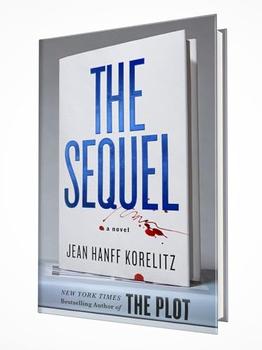Summary | Excerpt | Reading Guide | Reviews | Beyond the Book | Readalikes | Genres & Themes | Author Bio

The Book Series #2
by Jean Hanff Korelitz
One night a novelist in residence gave an after-dinner reading in a separate building where the works of former colonists joined the surviving library of the estate's original owners. She sat in an armchair while he read a pained description of a farmhouse creaking through an Iowa winter. It was deadly, and she was too bored to do anything but concentrate on her own facial expression, keeping it as near as she could to engaged interest. This person had a newly minted MFA and a newly signed contract with Knopf for his first novel, of which this inert prose comprised the opening chapter. When he finished, there were polite questions: How did a novelist incorporate visual impressions into written description? What was the influence of place on his work? How engaged should a writer be with the idea of gendered perspective?
She wasn't paying much attention to this, either, so it was a rude interruption when the novelist tossed one of these questions in her own direction.
"What is it like for the rest of us writers? I don't want to speak for you."
He was looking at her.
What was what like?
"Oh," she said, rousing herself. "I'm not sure I can answer. It's very new for me, all of this. Writing, I mean."
Now they were all looking at her. Every one of them.
"You mean," said the combative young person, "you've never written before?"
"I haven't published yet," she amended, and hoped that would be that.
The person stared at her.
"How'd you get in here? I have friends who get turned down year after year. They have books."
Nobody spoke.
"Well," said someone, after a very uncomfortable moment, "it's not just about publications. It's talent."
A performance artist with three long skinny plaits now elbowed the offended person and began speaking into that person's ear.
"Oh, okay," the no-longer-quite-so-offended person said. "I get that."
Get what? Anna thought, but of course she knew. She knew that, to them, these real artists, she was no more and no less than the special case, the literary widow who was being indulged, by someone who ought to have known better. She was not to be admired for this, obviously. Neither was she to be pitied or given special consideration, let alone offered the undeserved leg up of an impossible-to-get residency at this temple to art, just because what she was attempting, in writing her nonexistent novel, was apparently very noble and redemptive! And also: so feminist!
Well, fine. She got that, but then again, why shouldn't she be as fine a writer as her dead husband, who had left literature so prematurely, so long before his many theoretically great works could be written? So what if she, the widow, had shoved unnumbered "real" writers out of the way in her noble pursuit of fiction! Perhaps this particular enraged writer, or their deserving friends, had been passed over for a cabin in the woods and a picnic basket on the doorstep, but did any of them have any idea what she had had to endure, just to get here? Which of these poseurs was remotely qualified to pass judgment on her?
None of them, obviously. This Iowa auteur with his creaking house on the snowy prairie? The other auteur writing his navel-gazing "metafiction"? The new person, who was apparently writing a thousand-page dissection of a dying Rust Belt town, the subject of a recent bidding war?
She might not know much about fiction, but she knew she had no interest in reading any of those books.
There was applause. This literary event, mercifully, was over. Across the room, somebody opened a bottle and eased the plastic cups out of the plastic sleeve. The performance artist slipped out into the night, to return to her studio. One of the composers began flirting aggressively with a wan young poet from Brooklyn. Every one of the writers gave her a wide berth, either because she had embarrassed them or because they were embarrassed on her behalf. She didn't know and she didn't care. She considered them absurd people who prioritized absurd things, like whether a review had a box around it or a star next to it, or who'd been invited to some festival to read their pages to the empty seats in the tent, or whether they'd been deemed a twenty-under-twenty or a thirty-under-thirty, or, for all she knew, a ninety-under-ninety. What did it matter? More to the point, what difference did any of it make to how good the books they wrote actually were, or whether a normal person—herself, for example—would even want to read them?
Excerpted from The Sequel by Jean Hanff Korelitz. Copyright © 2024 by Jean Hanff Korelitz. Excerpted by permission of Celadon. All rights reserved. No part of this excerpt may be reproduced or reprinted without permission in writing from the publisher.
Your guide toexceptional books
BookBrowse seeks out and recommends the best in contemporary fiction and nonfiction—books that not only engage and entertain but also deepen our understanding of ourselves and the world around us.